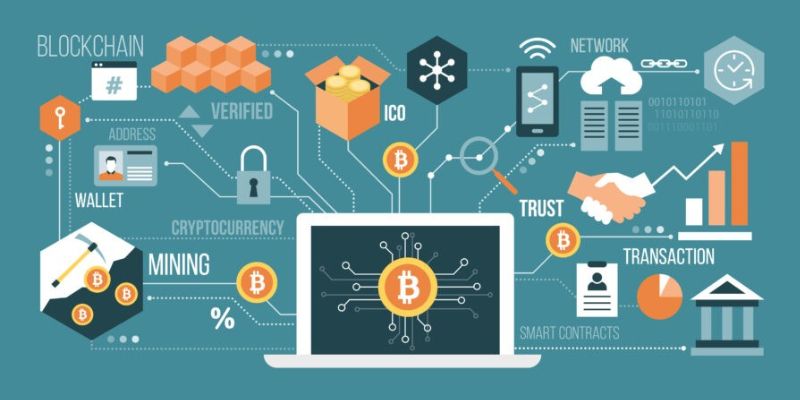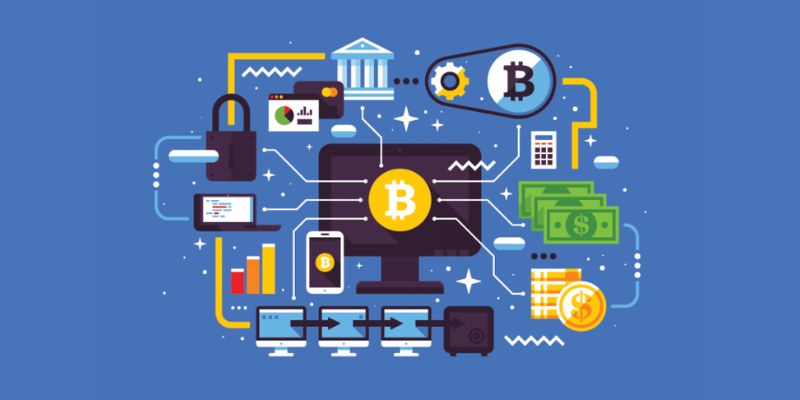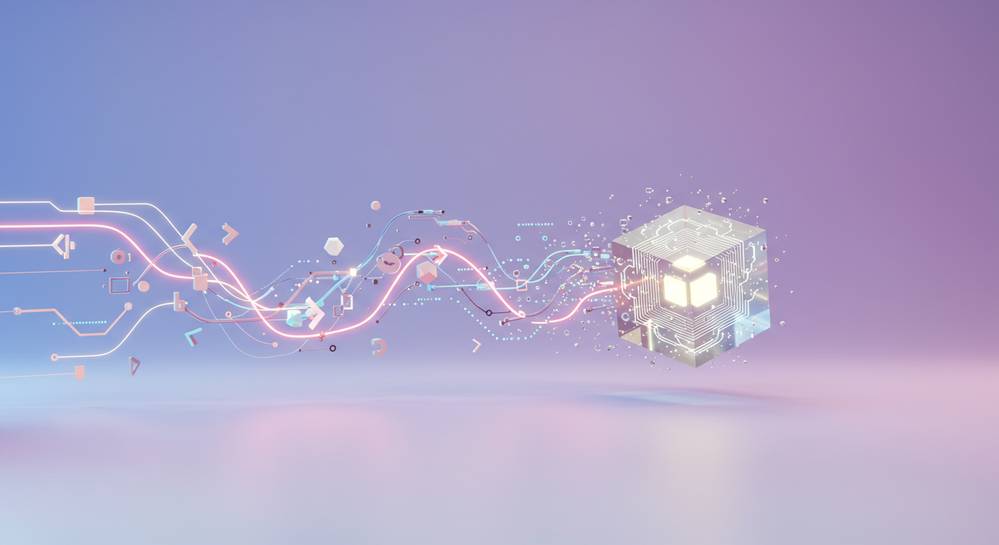Industries Transformed: How Blockchain Technology Reshapes Business Landscapes
Imagine a world where your money moves faster and safer. Where you can trace each pill from the maker to your medicine cabinet. A world where you earn points for shopping that are actually good as cash. That’s not just a dream—it’s becoming real as blockchain tech hits the ground running. I’ve seen firsthand how the industries most impacted by blockchain technology aren’t just changing; they’re getting better and smarter. From banks making your cash work in real-time to keeping our drugs safe, this isn’t just an upgrade. It’s a whole new game. Want to know how deep this rabbit hole goes? Keep reading, and let’s take this journey through business transformed by blockchain.
The Financial Revolution: Blockchain Reshaping Banking and Finance
Cryptocurrency and the Banking Sector
Banks feel a big shift. They watch as customers change how they think about money. Folks want safe, quick ways to pay and send cash. This is where cryptocurrency comes in strong. It’s digital money that moves fast, and blockchain makes it happen. It deals with money without needing a bank. That’s a big deal!
How is cryptocurrency changing banks? It cuts the time it takes to move money around. Normally, banks take days to send money, especially overseas. With cryptocurrency, it happens in seconds. It’s super cheap, too, and you don’t need a bank to do it.
Banks are trying to keep up. They’re using blockchain to make their work better. They’re making their own digital money and using tech to track it. This tech is called blockchain. It’s like a book that keeps all records safe and sound. No one can mess with it. That means fewer mistakes and no cheats.
The Emergence of Decentralized Finance
Next, there’s this wild thing called decentralized finance, or DeFi for short. It’s like making a whole new world for money that’s fair for everyone. It uses blockchain to cut out the middleman. No banks. No paper. Just you and your money, safe and easy.
Why does DeFi matter so much? It gives power to the people. No matter who you are or where you live, you can get into DeFi. It’s open and runs all the time. You can borrow, lend, and earn interest. And it’s not just for geeks. DeFi’s for anyone ready to try a new way to do money.
DeFi is still growing. It’s like baby steps for now, but it’s getting bigger every day. Some folks worry about how safe it is. But the truth is, DeFi’s built on trust. The code shows everything that happens. No secrets. No tricks.
This is the future, no doubt. Both cryptocurrency and DeFi are shaking up finance, big time. They’re changing how we use, save, and think about money. And you better believe it, the best is yet to come. So buckle up! We’re in for a wild ride with blockchain leading the charge.

The New Era of Logistics: Enhancing Supply Chain with Blockchain
Streamlining Shipping and Tracking with Smart Contracts
Smart contracts in logistics cut steps and save time. They self-execute when set terms get met. For instance, when goods reach their destination, payment releases without delay. No need for middlemen or waiting. This way, we see fewer errors and faster trade. It’s real supply chain magic, right?
Let’s dig in. When we ship goods, a lot usually happens behind the scenes. We’re talking paperwork, clearance, inspections, and more. But smart contracts automate these steps. They hold data, like arrival times and conditions met. And if everything checks out, they move to the next step. All this happens on a blockchain, safe and sound.
Here’s how it impacts us. Lower costs, since we cut down on admin work. Quicker shipping, because delays drop and efficiency climbs. And the best part? We can trust it. The blockchain keeps a record of everything, and nobody can mess with it once it’s there.
Boosting Supply Chain Transparency and Security
Think about the last item you bought. Ever wonder where it came from? With blockchain, we can track every step. From raw material to the final product in your hands. This boosts trust because we see all the markers of an item’s journey.
Security’s a big deal too. In the blockchain world, data gets split into blocks and linked up, making it real tough to tamper with. This matters for keeping our stuff safe. We don’t want fakes slipping into the chain. Plus, if something’s off, we find out fast and fix it.
So, here’s the deal: clear tracking means we can be sure of what we buy. It shows us the real story of our goods. And that’s not all. It’s not just about the things we buy. It’s the same for medicine, food – you name it. We get safety, which is a win for everyone.
What’s more, suppliers around the globe get to join the blockchain mix. It’s not some closed club. This opens doors to new markets and growth chances for businesses everywhere. And it’s quite straightforward – no hidden tricks!
In short, smart contracts and blockchain are taking logistics to new heights. We’re seeing a step-change in how things move around our planet. As someone knee-deep in this tech, I’m here to tell you, it’s a game-changer. Get ready to see more blockchain tags on your stuff soon. This is just the start!

Ensuring Integrity in Healthcare: Blockchain’s Role in Data Management
Securing Patient Records and Enhancing Privacy
You trust your doctor, right? But how about their computer systems? That’s a bit iffy. You’ve probably heard “blockchain” in terms of Bitcoin. What if I told you it keeps your health records safe too?
How does blockchain help protect patient records? It creates a secure, unchangeable record system.
Every time data gets added, it’s locked in across a network of computers. No single point of failure, no easy access for hackers. Think of it as a digital vault that only opens for you and your doctor.
With blockchain, your personal health info gets the VIP treatment it deserves. Each piece of information gets its own unique code. Like a lock combo that only you and your doc have. That’s how blockchain bumps up privacy to a whole new level. It’s not just good; it’s better than current systems.
Your files are broken up, scattered across the network. Think puzzle pieces in a secure treasure hunt. Even if a bad guy grabs a piece, it’s useless without the rest. Your secret stays safe.
Drug Traceability and Real-Time Information Sharing in Healthcare
Now let’s talk drugs—and not the funky kind. Meds go from labs, through factories, across the world to your pharmacy. It’s complex, and sometimes things go wrong. Pills might be fake, or get recalled. You want to know your meds are legit.
How does blockchain improve drug traceability? It watches drugs from creation to delivery.
Each step is recorded on this wonder tech. No more mix-ups or question marks. Every pill can be tracked back to its roots. Imagine scanning your medicine’s barcode with your phone, and its whole journey pops up. It’s like having a med passport at your fingertips.
Hospitals can also share data with zero lag. Think instant updates across the board. Doc A in one hospital knows what Doc B in another did, seconds ago—not days. This means better care, fewer mistakes. It’s teamwork made easy.
Blockchain in pharma is reshaping drug safety and trust. It’s a game-changer, both for those who make meds and those who take them. Every pill, every shot, mapped on this secure, clear ledger. No fake drugs, no expired doses, just the good stuff, as it should be.
There you have it. Blockchain isn’t just for the finance folks; it’s a hero in scrubs too. It’s keeping your records locked down and your meds in check. This tech isn’t just cool, it’s caring. It’s a silent guardian for your health, a watchful protector in the fight for privacy and safety. The world of healthcare data management just got a major upgrade, and blockchain is the tech-savvy doctor leading the charge.

Retail Innovation through Blockchain: Loyalty and Trust Redefined
Revolutionizing Loyalty Programs with Blockchain Technology
Have you ever lost a punch card or forgot to claim a deal at your favorite shop? It’s annoying, right? Well, blockchain is here to make loyalty programs easier and keep customers like you happy. Shops are using blockchain to create smart loyalty programs. You get your rewards easier and stores keep you coming back. It’s a win-win!
Stores give points for shopping that you can trade for discounts or gifts. Picture this: every time you buy something, you earn points right away. With blockchain, your points are safe and cannot be lost. You can see them grow and decide when you want to use them. Think of it like a game, where you score points for buying things you’d buy anyway.
Harnessing Consumer Behavior Data for Enhanced Retail Strategies
Stores want to know what you like. Not to be nosy, but to sell you the right stuff. By checking what folks buy, shops can offer better items. They can also make deals that are just right for you. But how do they keep all this info safe and sound? You guessed it – blockchain!
When you shop and use loyalty points, blockchain keeps track of it all. So, stores know what’s hot and what’s not. This means they put the right goods on the shelves and you find what you want. Pretty handy, huh?
Also, you don’t need to worry about your info getting out. With blockchain, your shopping habits are like a secret recipe that only the right folks can see. This ensures stores can make smart choices without putting your data at risk.
In short, blockchain in retail changes how we earn rewards and keep our info safe. And it’s just getting started!
We’ve explored how blockchain is changing our world, from banks to shops. It’s reshaping finance by introducing digital currency and new ways to handle money without big banks. This leads to a fresh kind of finance world where people trade directly with each other.
In delivery and making stuff, it helps track items better and keep goods safe. It makes sure things go from point A to B smoothly. It’s like a trusty logbook that never lies.
In hospitals and with our health, it keeps our personal info safe. This means doctors and nurses can share important health details fast and in private. It even makes sure our medicines are the real deal.
For shopping, it changes how we get rewards and understand buying stuff. Stores know better what we like, and we get points that are worth more.
Bringing it home, blockchain is more than tech talk; it’s a real change in how we do things every day. It’s smart, safe, and can make life better for all of us. Let’s dive into this new digital world and see how it can work for us. Trust me, staying in the know on blockchain is a smart move!
Q&A :
How is blockchain technology influencing major industries?
Blockchain is revolutionizing many sectors with its ability to offer secure, transparent, and decentralized transactions. Industries like finance have seen an emergence of cryptocurrencies, smart contracts, and distributed ledgers that are reshaping banking and investment services. Supply chain management is employing blockchain to ensure product authenticity and to streamline operations. Meanwhile, the healthcare industry is tapping into blockchain for secure patient data exchange and to combat counterfeit drugs.
What are the top industries being transformed by blockchain?
Some of the top industries where blockchain is having a transformative impact include finance, where it underpins cryptocurrencies and new fintech solutions; supply chain, where it offers traceability and efficiency; healthcare, for secure medical record-keeping; real estate, through tokenization and fractional ownership; and even government, for enhancing transparency and public service processes. Other emerging sectors include energy, for peer-to-peer transactions, and entertainment, for content rights management and distribution.
What types of blockchain applications are emerging in different sectors?
In the finance sector, decentralized finance (DeFi) applications are emerging, allowing for more accessible financial services without traditional intermediaries. Supply chains are seeing the rise of blockchain for tracking goods from origin to consumer, ensuring authenticity and reducing fraud. Healthcare applications are focusing on patient data management and secure sharing between entities. In real estate, blockchain is used for streamlining transactions and record-keeping. Additionally, voting systems, identity verification, and intellectual property rights are also areas where blockchain applications are developing.
How does blockchain provide a competitive advantage in certain industries?
Blockchain offers a competitive advantage by enhancing transparency, security, and efficiency of operations. For instance, in the supply chain industry, companies can track products in real time and verify their authenticity, which builds trust with consumers and can reduce costs related to counterfeits and inefficiencies. Financial institutions using blockchain can offer faster and more secure transactions at lower costs. For companies prioritizing data security, blockchain’s immutable ledger ensures that sensitive information cannot be altered or hacked, thus maintaining data integrity.
Are there any industries that are resistant to blockchain adoption? Why?
Despite its many benefits, some industries are hesitant to adopt blockchain, often due to the regulatory uncertainties, lack of standardization, or the significant changes required to existing systems. The financial sector, while benefitting from blockchain, also faces regulatory challenges and concerns about security and privacy. Industries with complex supply chains might resist blockchain due to the scale of investment required for implementation. Moreover, certain sectors may have entrenched interests that perceive blockchain as a threat to their established business models, leading to resistance. The energy required to sustain blockchain operations also raises environmental concerns, causing some to reconsider its adoption.



